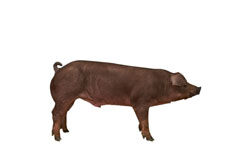



Boar Taint Has to Go
EU - Meat contaminated with boar taint could become a reality in Europe. In 2018, boar castration will be abolished. Boars that are not castrated risk developing boar taint. DanBred aims to reduce the risk of boar taint using genomic selection.
Boar castration is to be abolished in Europe to improve animal welfare. The problem is that boars that are not castrated risk becoming contaminated with boar taint. Boar taint is an unpleasant boar scent in pork. Unfortunately, we may have to get used to this unpleasant scent of boar in our kitchens.
Boar taint will undoubtedly influence the market for pork. The Danish Pig Research Center aims to reduce the risk of boar taint after the abolishment of castration.
Genomic selection shall remove the taint
The objective is to reduce the number of pigs developing boar taint using genomic selection.
Researchers from Genetic Research and Development at the Danish Pig Research Centre are collaborating with one of Europe's leading universities (LIFE) to implement genomic selection to reduce boar taint. With cutting-edge competence within for example other food products, animals and animal welfare, LIFE - the Faculty of Life Sciences at Copenhagen University, will be a strong partner.
Researchers will use genomic/DNA information to detect pigs that have a low risk of becoming contaminated with boar taint. These pigs will be candidates for selection.
Knowledge clears the path
DanBred and the the Danish Pig Research Centre expect that this project will reduce the risk of boar taint in boars that are not castrated. In the longer term, DanBred hopes to export breeding stock with a low risk of developing boar taint. It also hopes that it will contribute to a sustainable pig production that considers social and environmental issues.
- This project is supported by the Danish National Advanced Technology Foundation and is a three-year post-doctoratal project.








